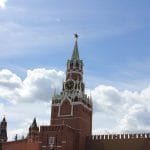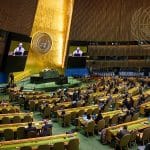The outcome of the bilateral meeting in Sofia May 17 between Greek Prime Minister Alexis Tsipras and Macedonia/FYROM Prime Minister Zoran Zaev disappointed the few that held out hopes that the meeting itself would produce rapid progress towards a solution.
All of the players will now focus on using the time before the June 28-29 EU Summit to generate sufficient bilateral progress to allow Greece to somehow concur in the start of formal EU accession talks with Macedonia/FYROM, most likely in the absence of a final agreement.
Many in Greece, however, see this approach as a form of salami tactics which will undermine Greece’s negotiating position and thus argue for a more traditional diplomatic solution — a final agreement in place and implemented in exchange for the required Greek approvals for EU and NATO accession for Skopje.
Although the foreign correspondents covering the EU-Western Balkans Summit informally labelled the May 17 meeting as “The Day of Greece,” their hopes for a once-in-a-decade scoop based on the Tsipras-Zaev Davos-style meeting the morning before the summit began quickly faded. They were rewarded, however, by Tsipras’ revelation during a press conference that a late-night marathon discussion that covered many details occurred on May 16, a day before the somewhat flat official session during the summit.
It seems the two leaders decided that a meeting out of the media spotlight just after the May 16 dinner for the Party of European Socialists meeting would be an appropriate venue to hammer out issues in detail. So they did.
Readers may recall that on April 18, Greek Foreign Minister Nikos Kotzias already declared the timeline for a summer 2018 approval by NATO for the accession of Macedonia/FYROM as unworkable. The Greek side has not been as specific in relation to the launch of time-consuming EU accession talks for its northern neighbour, providing a “relief valve” of sorts that would help keep diplomatic progress on track into the second half of 2018, despite the NATO setback for Skopje.
Tsipras made a few important points in his press conference on May 17, saying Greece was not faced with a real deadline in the Name Dispute talks and explained there was still a substantial gap on important issues, all of which needed to be agreed or there was no deal. He believed the June 28-29 EU Summit and preparatory meetings were important milestones and thought it was possible to lock down an agreement before that time, although it would be a considerable challenge.
“We are examining all of the details step-by-step, but are not in a position yet to talk about an agreement,” Tsipras said. “We would both like to see a result in time for the [EU] summit in late June. I believe we have covered a major part of the distance, but there is still distance to cover,” he added.
Tsipras noted a new bilateral leaders meeting could be held in early June to hammer out additional agreements and make more progress on open issues. The northern Greek town of town of Prespes, on the border with Albania and Macedonia/FYROM, was mentioned as a possible venue for a potential rendezvous. Tsipras also thanked opposition leader Kyriakos Mitsotakis, who also attended some meetings in Sofia, for making statements that were not divergent from the so-called “national negotiating position” and kept Greece’s objectives more or less constant.
Zaev’s remarks to the press May 17 have been extremely positive, but that has been his style throughout this process, which should cause observers to re-evaluate his optimism.
“I am Zoran and my partner’s name is Alexis. And we have to consult the other political factors in our countries with our presidents and the other political leaders. And if they accept, then we can have a solution,” before adding, “We have discussed one (specific) solution to the Name Dispute that could be acceptable for both sides, but we need to have further discussions in our countries. We are solving a dispute in order to strengthen the identity of our citizens in both nations,” he added.
Although it might not be “The Day of Greece,” developments in Sofia should be encouraging to enlargement supporters in Brussels. That’s the party line, although we hear that some believe that several key EU Member States are less interested than the Commission itself in the accession of new members.
Things may change with the start of the rotating Austrian EU Presidency on July 1.
Name Dispute negotiations: Late nights, roadmaps, and summer summits
Tsipras reveals marathon night discussions held over May 16-17
- Advertisement -
- Advertisement -







